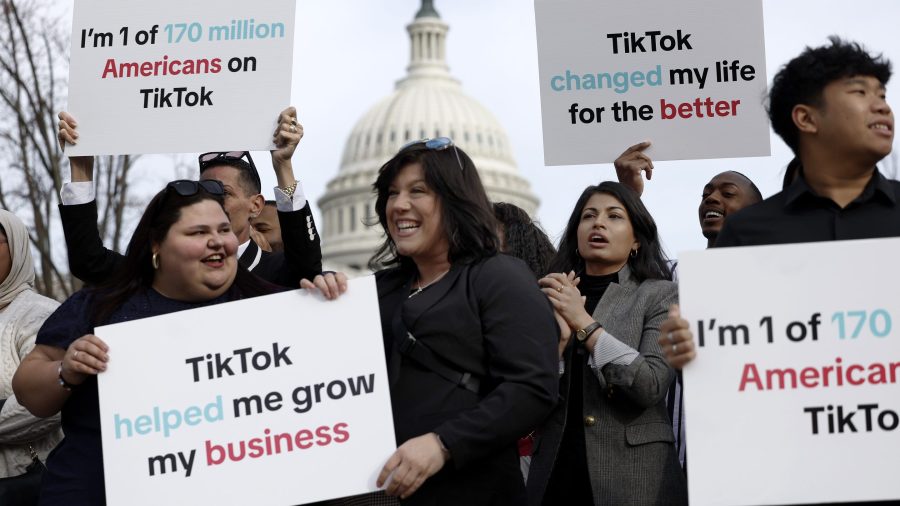Potential TikTok ban stirs anxieties in small-business owners

A law signed by President Joe Biden last month would force TikTok to divest from its Chinese parent company, ByteDance, or be banned in the United States because of national security worries. And it’s making a lot of small-business owners like Desiree Hill anxious. She’s the owner of Crown’s Corner Mechanics in Conyers, Georgia, a mobile repair shop that fixes and rebuilds cars.
“I feel it would be detrimental to my business [if TikTok were banned],” Hill said. “I saw what happened when I took it to a whole new level by uploading to TikTok and sharing what I do to the world. I tripled my business in a year. I was making $85,000 the year before, and I went over $350,000 the second year. And I’m going to triple that this year because of what I do with TikTok.”
Although Hill started her career as a nurse, she was interested in cars and learned how to fix them by watching YouTube. And in 2018, she left her nursing job and pivoted to social media, where she made posting about her projects a full-time gig.
“I’m making really good money at this,” she said. “I can be with my kids all day if I want to. They’re involved, and I’m learning a new trade, they’re learning a trade.”
Three years after she started @theshemechanic TikTok account, she’s getting national attention.
“I’m getting calls every single day of people who live maybe three or four states away,” she said. Some people found her on the app and then sought her repair expertise.
“I even had a guy in California who saw my TikTok. And he knew that I could work on what we call old-school vehicles. And he had an El Camino that was sent from California all the way to me just so I could rebuild it,” Hill said. “I think that’s what was really making a huge difference in my business because I wasn’t just reaching the community around me. I was reaching people that had never seen a female doing what I’m doing, and they’re doing it well.”
She now has more than 50,000 followers on TikTok.
She credits a viral video from a previous account and the ad dollars she spends on the platform for her success.
The same has been true for Ruben Trujillo, owner of Cafe Emporos, a business that sells handcrafted greeting cards that are paired with pouches of coffee and tea. Trujillo started doing business on TikTok during the COVID-19 lockdown.
“My intention was to make these greeting cards. But then I had businesses reach out to use them as business cards,” Trujillo said. “Brides were using them as wedding favors. So going forward, that’s what I’m working with now, businesses and brides, to kind of bring a special caffeinated favor for their events.”
Four years later, he said his business has grown thanks to the app.
The overall marketing cash spent on the platform contributed $24.2 billion to U.S. gross domestic product, according to a recent economic impact report by Oxford Economics, commissioned by TikTok. Small businesses active on the app created more than 200,000 jobs, the report says.
“We see a rise especially among the younger generation that actually use social media platforms as a search engine, so it’s almost like they use it as a Google for product discovery,” said Jeremy Yang, an assistant professor of business administration at Harvard University who focuses on the creator economy.
“You’ll be exposed to this content, even if you’re not actively searching for them,” he added. “If the users are spending more time engaging with content on the platform, which is cited in that Oxford Economics report, then potentially you have a bigger impact in affecting the behavior of the users in terms of driving sales.”
Ruben Trujillo of Cafe Emporos said if the app is banned, he’d be missing out on these unique business tools from TikTok.
“Virality isn’t the only thing that’s going to sustain a business,” Trujillo said. “TikTok realizes that, and that’s why they brought on so many other business tools to help create sustainable businesses.”
And Desiree Hill of Crown’s Corner Mechanics said all that doesn’t exist on other platforms like it does on TikTok, so she’s anxious for what’s next for the short-form video app and her business.
“If our businesses are cut in half because we lose customers or followers from TikTok, that’s less taxes that we’re paying to the government based on our sales,” said Hill. “Our sales are going to drop. That’s less money [the government is going to] receive. And now how many business owners use TikTok for that? They need to look at it in more than one way.”
TikTok has sued the U.S. government over the potential ban. The U.S. Court of Appeals for the District of Columbia has scheduled oral arguments for September.
The future of this podcast starts with you.
Every day, the “Marketplace Tech” team demystifies the digital economy with stories that explore more than just Big Tech. We’re committed to covering topics that matter to you and the world around us, diving deep into how technology intersects with climate change, inequity, and disinformation.
As part of a nonprofit newsroom, we’re counting on listeners like you to keep this public service paywall-free and available to all.
Support “Marketplace Tech” in any amount today and become a partner in our mission.












